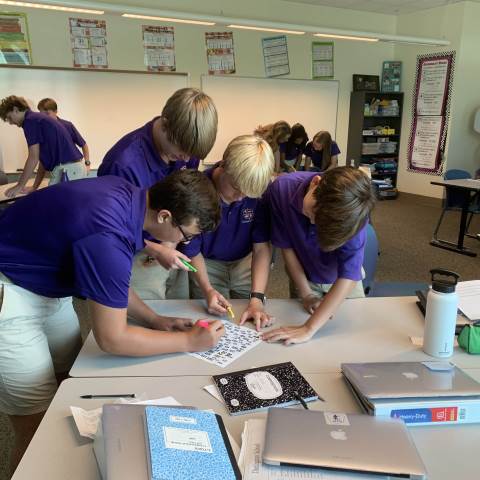

This past October, Chad Woods and I were given the opportunity through a Thatcher Professional Development Grant to go to the Georgia Council of Teachers of Mathematics (GCTM) conference in Eatonton, Georgia. My goal for the conference was to find tools and other resources for all of our math teachers in the Pre-K to 8 division, as well as find some great manipulatives and resources to support student learning in my classroom. With that said, here are my three biggest takeaways from the GCTM conference.
My first takeaway is to make sure our kids play! Teachers that involve play within their classroom not only have more fun with their students, but the students actually perform better and develop a more thorough understanding of the material. I have found numerous ideas from those sessions, recommended books, videos, and activities that switch up the normally monotonous material and make it more fun for the learner. Some great examples include some dice games, card games, math battleships, and cooking labs that make the concepts fun.
My second takeaway is to make sure that when we are introducing new concepts to consider the three steps of the CPA model: concrete, pictorial, abstract. To me, the most important of the three is the concrete method and that is the one that is skipped the most because it is the most challenging to teach and the most time consuming. Concrete is the familiar, real-life, tangible manipulatives or objects that students can play with to help grasp a concept. From an understanding there, then we can then use the pictorial method which uses symbolic pictures or representations of the actual material. While abstract concepts can be seen on paper, it is not something tangible that you could hold onto, like multiplication signs and fraction bars. Many times we skip straight to abstract for time’s sake and that’s where we lose them. Spending extra time with concrete will pay big dividends when you get to the abstract concepts.
My third takeaway is to relook at how teachers do stations. How often does a student say, “I was never taught this or I don’t remember how to do this”? Well, if you’ve heard this, then the student does not have true mastery of that concept. The teacher’s main purpose of stations should be to develop “teacher free” game areas for students to reinforce concepts that at least 33% of the students have mastered and at least 67% have almost mastered. The reason for the 33% and 67% is based on the grouping of the students. If I were to put the students into groups of three, the 33% would make sure to have at least one student (67% would be two) in each group that has mastery of the concept. If I have groups of four, then I need 25% (one) of the students to have mastery and 50% (two) of the group to have almost mastery.
This process should allow for students to use each other (peer to peer teaching) at the station for questions while allowing the teacher to pull students to work on skills that have other deficiencies. I’ve been guilty of doing stations on all current material and I find myself explaining the stations more versus being able to work with students on what they really need. I strongly recommend pairing up students by their ability of that concept and just let them have fun. Save any new material for when you pull the students to your table.
Hopefully, one of these takeaways might help you think of something to improve your classroom, help your child, or give you an idea of how to explain something to a colleague. I know as parents and teachers, we might get frustrated when “we’ve already gone over it” or have “showed or told them how”, but don’t take it personally. Second thought, do take it personally (I do) and try to figure out where you might need to meet that child in the material. Sometimes they need a little refresher on the abstract piece while other times we might need to dig down into the concrete to look at the concept a little deeper.
I am so grateful for the opportunity that the Thatcher family has given me and my colleagues. I am so thankful to work at a place that values constant improvement and have the opportunity for my children to experience Darlington as part of their education path.